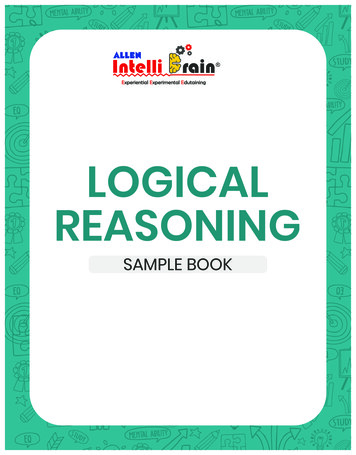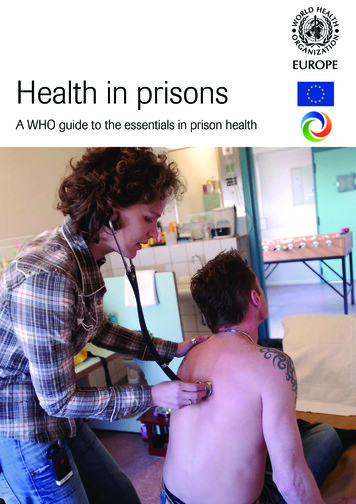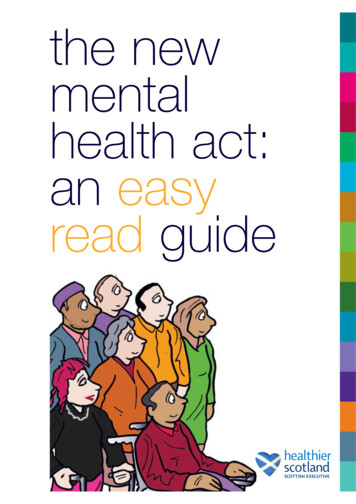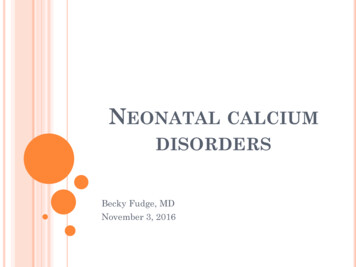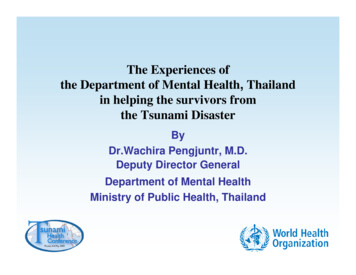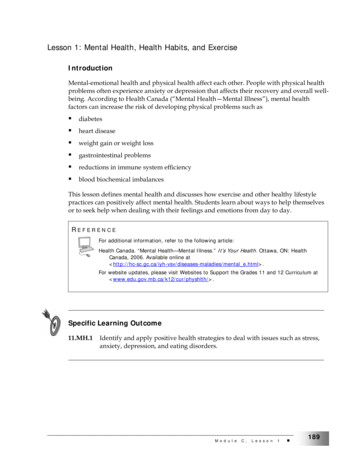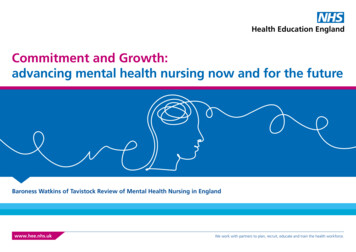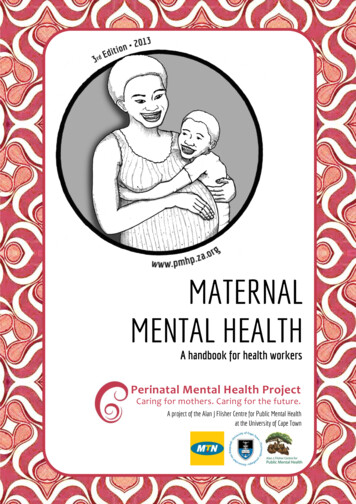
Transcription
MATERNALMENTAL HEALTHA handbook for health workersPerinatal Mental Health ProjectCaring for mothers. Caring for the future.A project of the Alan J Flisher Centre for Public Mental Healthat the University of Cape Town
MATERNALMENTAL HEALTHA handbook for health workers2013Perinatal Mental Health ProjectCaring for mothers. Caring for the future.Alan J Flisher Centre for Public Mental HealthDepartment of Psychiatry & Mental HealthUniversity of Cape Town46 Sawkins Road, Building BRondebosch 7700South AfricaISBN (print) 978-0-620-56427-4ISBN (ebook) 978-0-620-56428-1Creative Commons LicenceThe contents of this Handbook may be used, disseminated and expanded on for non-commercial purposes,with proper acknowledgment to the PMHP, and the information so created must remain freely accessible inthe public domain. The Creative Commons License does not apply to material copyrighted by a third party.ii
ForewordThe Perinatal Mental Health Project (PMHP) provides training to healthworkers and community-based workers involved in caring for mothers. Thishandbook is intended as a supplement to this training programme and as aresource to anyone involved with mothers and mothers-to-be.The handbook should be used in an active way: use it and add to it as bestsuits your local setting. The intended outcome of this handbook is to improve the quality of service offered to women in emotional distress and tomeet the needs of maternal health workers, like you, who want to be betterequipped in this task.The handbook covers a range of topics. Each chapter has a clear set oflearning objectives and a summary. Some chapters include practical activities which should help with linking the theory with your practice.Chapter 1 provides an overview of maternal mental illness, and explainswhy it is an important issue for health workers.Chapter 2 explains why the perinatal period is a crucial time in amother’s life and highlights the importance of the relationship between you and the mothers in your care.Chapter 3 helps you understand what mental illness is and the commontypes of mental illnesses which can present during the perinatal period.Chapter 4 outlines why pregnant women should be screened for mentalillness and gives tips on how to screen.Chapter 5 highlights several practical tips for making referrals and whatyou can do when these are not possible.Chapter 6 gives an overview of treatment options, such as counselling,for women who are experiencing mental health problems.Chapter 7 provides an overview of special issues that health workersshould think about when caring for mothers with particular needs.The Resources section includes several resources that you may finduseful while working with mothers.iii
Background to maternal mental illness in South AfricaIn this handbook, the ‘perinatal period’ refers to the period from pregnancy,through labour, up to one year after birth. Pregnancy is a difficult time formany women, and those with the most need for mental health care oftenhave the least access to it. Also, during this time, both mental illness andpoverty impacts on the woman, the foetus or infant, the family and thewider community. Maternal and mental health services need to begin to address this serious public health problem.Women access health services for their maternal care during the perinatalperiod. This presents an opportunity to provide care for women in mentaldistress. By getting involved at this early stage, preventive work, involvingscreening and counselling, can be done. This could help women, their children and society in general.About the Perinatal Mental Health ProjectThe PMHP was started in 2002 to address the high rates of mental distressamong pregnant women and mothers living in difficult situations. The Project began at the Liesbeeck Midwife Obstetric Unit at Mowbray MaternityHospital in Cape Town, and now also operates at three other Midwife Obstetric Units. The service includes three main components: screening, counselling, and psychiatry. These are provided free of charge and integratedinto the maternity clinic. The PMHP also provides training for health workers and community workers, conducts research to help improve service delivery, and is involved in advocacy work.The PMHP believes that ‘caring for mothers is caring for the future’. Recognising the need for public maternal mental health services, it is the PMHP’svision for all women to have access to quality maternal mental health care,integrated into regular maternity services. To achieve this vision, the PMHPpartners with the Department of Health and works with civil society, international organisations and academic institutions to implement its four interrelated programmes. These programmes form an innovative model for integrated mental health services.PMHP’s long-term objective is to provide a model of maternal mentalhealth, with effective tools and strategies, to partnerships and agencies capable of rolling out maternal mental health services nationally.Simone HonikmanDirectoriv
ContentsForewordAcknowledgementsiivi1. Introduction11.12461.21.3Why is it important to focus on maternal mental health?Risk factors linked to poor maternal mental healthSummary2. Maternal care: A relationship between you and the mother92.12.22.32.42.52.6101012202531The mother and the perinatal period: a time of changeWhy is your relationship with the mother so important?The emotional state of women in your careThe emotional state of the health workerA journey through ‘secret histories’Summary3. Maternal mental illness333.13.23.33.43.53.6343543484849Why is mental illness often overlooked?Types of mental illnessSigns and symptoms of maternal mental illness and distressWhy is an early diagnosis so important?How can you help women with mental health problems?Summary4. Screening for maternal mental illness514.14.24.34.452535866Why screen pregnant women for mental illness?The screening processScreening toolsSummaryv
5. How to refer a woman with mental health problems695.15.25.35.45.57074767982Types of referralsPractical issuesHow to make a successful referralWhen you cannot refer for counselling: some suggestionsSummary6. How to help women with mental health problems836.16.26.36.46.56.66.7848687879799102What do women who experience mental distress need?What is counselling?Providing supportive care: sharing informationHow to really ‘listen’What happens when someone is sent for professional counselling?Speaking and being heardSummary7. Special 105106107108109117112127132PovertyLack of supportHIV statusAdolescent pregnancyBeing a refugeeDrug or alcohol misuseDomestic violence and abuseChild abuseSuicideGrieving and loss: miscarriage and stillbirthSummary8. reening toolsMaintenance OrdersChild Support GrantsProtection OrdersHow to make a referralSouth African national helplinesvi
AcknowledgementsSeveral members of the PMHP team dedicated their hours and insights tothe development of this handbook. This work was also greatly enhanced bythe generous and invaluable contributions of many experts in the field ofmaternal mental health.Concept and Original Content DevelopmentSimone HonikmanSally FieldTechnical Consultation & Additional ContentEmily BaronBronwyn EvansSheila FaureAngela HutchisonLinda LewisIngrid MeintjesKaren MillerLiz MillsJoan Raphael-LeffHilary RosenthalLisa SandersBridget SchweitzerEditingEmily BaronSally FieldSimone HonikmanNatasa MeliIngrid MeintjesSarah SkeenJulie van der VlugtIllustrationsGraeme ArendseLayoutIngrid MeintjesThe PMHP is grateful to the MTN SA Foundationfor sponsoring the publication of thePMHP Maternal Mental Health Handbookvii
CHAPTER1IntroductionThis chapter provides an overview of maternal mentalillness, and explains why it is an important issue forhealth workers.Learning ObjectivesBy the end of this chapter you will know:Why maternal mental health is so importantHow widespread maternal mental illness isHow maternal mental health can affect infants, children, and familiesHow maternal mental health can affect communities and societyThe factors that are linked to maternal mental illness1
1.1 Why is it important to focus on maternalmental health?What is mental illness?Mental illness is a general term used to refer to any psychological or emo-tional disorder, illness or condition which prevents a person from functioning ‘normally’. Mental illness can disrupt a person’s thoughts, emotions orbehaviour.A specific type of mental illness can be identified by a combination of howa person feels, acts, thinks, or how a person perceives things. The way aperson feels and behaves can cause suffering to the person and others.What is the difference between mental illness and mental distress?The term mental illness is used when a person has a diagnosablemental condition. The term mental disorder may also be used.When it is clear that a person is experiencing some sort of mentalsuffering, the more general term used is mental distress.For example, a mother may be distressed about her baby being inhospital, but she does not necessarily have a mental illness. However, mental distress over a period of time can impact on a person’smood and general well-being, and may lead to a more serious mental condition.Some people also use other words for mental illness such as: ‘poormental health’, ‘mental health problems’, or ‘psychological stress’.Mental illness during and after pregnancy is very commonPregnancy and the postnatal period is a psychologically distressing time formany women, particularly those living in poverty, or with violence, abuse orHIV/AIDS. The burden of maternal mental illness (mental illness during andafter pregnancy) in low and middle-income countries is high.2
Introduction1In South Africa, nearly half of poor pregnant women experience depression,anxiety or other mental illnesses. This is three times higher than the prevalence found in developed countries. It is also significantly higher than therate in other developing countries such as Nigeria or Uganda.Though postnatal depression (depression after giving birth) is more commonly understood, both depression and anxiety are highly prevalent duringpregnancy. Studies in KwaZulu-Natal and Cape Town report rates of 47%for antenatal depression (depression during pregnancy) and 39% for postnatal depression. Antenatal depression is a strong predictor of postnataldepression. When maternal mental illness is left untreated, it can lead tomaternal mortality and result in poor outcomes for maternal and childhealth.Suicide is the newest leading cause of maternal deaths in developed countries. In most low and middle-income countries (including South Africa), suicide data is not accurately recorded. Yet, if the high rates of maternal depression are considered, coupled with poverty, unemployment and substance use, maternal suicide is likely to be very high in these regions.There are not many postnatal services for women in low- and middleincome countries. In South Africa, there are no formal screening programmes to identify women who are at risk of mental illness and no dedicated mental health services during the perinatal period. For the commonmental disorders (CMD) depression and anxiety, very few management procedures and treatment options exist. Plus, it is difficult for health workers topick up on women’s psychological problems because of staff shortages,high patient numbers and inadequate staff training in mental health.Impact on infants, children and familiesMental illness can have long-lasting consequences from one generation tothe next: studies show links between mental illness in parents and pooremotional, physical, and developmental outcomes for infants and children.For example:Mental illness in pregnant women is associated with:poor foetal growthpremature deliveryAs a result, infants could bemore vulnerable to infections and diseasesmore frequently admitted to hospital3
These health outcomes are linked to infant mortality and impaired development of children under five years - especially in contexts of poverty, violence, and poor education. Also, children of mothers with mental illness aremore likely to:be abusedperform poorly at schooldevelop mental illness themselvesImpact on societyBecause parental mental distress has a negative effect on the social, emotional, cognitive and physical development of children, poor parental mental health can have a negative impact on the educational and economic potential of children in a country.Therefore, addressing the mental health needs of mothers has positive implications for the well-being of women, their children and families, as well astheir wider communities and society.In South Africa, there are many risk factors which can contribute to maternal mental illness, especially among women living in poverty.Social, economic and physical factors can contribute to women’s risk formaternal mental illness. Some of the primary risk factors are described inthis section.1.2 Risk factors linked to poor maternalmental healthDefinition: risk factorThe risk is the likelihood of suffering from an illness, harm or lossbased on certain characteristics. A risk factor is something that increases the chances of a person developing a particular illness or disease.4
Introduction1PovertyWomen who live in poverty are more likely to develop mental illness due tothe added stress of unemployment, poor housing, and food insecurity. Atthe same time, women with mental illness are more likely to slide into poverty as they experience growing isolation and stigma, limited ability to engage in income generating activities, and increased health costs.Violence and abuseWomen can be at increased risk of domestic violence during pregnancy.Domestic violence also tends to become more severe as pregnancy progresses. Women who experience violence are more likely to become depressed and anxious.The opposite is also true: women with mental illness are more vulnerable tobecome victims of violence.RapeRape can affect women’s mental health, while women with poor mentalhealth can be more vulnerable to this type of abuse.HIV/AIDSWomen with HIV/AIDS have special mental health needs. Many womenlearn their HIV status for the first time during pregnancy.The process of adjusting to this news anddisclosing to family and friends could resultin guilt, stigma and rejection by partners,family or the community.HIV/AIDS can affect the brain andadapting to medication can alsocause emotional distress.On the other hand, positive mentalhealth can improve adherence toanti-retroviral medications including Prevention of Mother toChild Transmission interventions,and can improve the use of antenatal care.5
Adolescent pregnancyAdolescents are particularly at risk: they are twice as likely to experience depression compared to pregnant adults. Also, teen mothers with depressionare more likely to get pregnant again within 1 to 2 years than those teenswho are not depressed.Refugee statusIn fleeing their countries of origin, refugee women may have experiencedextreme trauma, violence, rape, the loss of loved ones and great emotionaldistress. They are also more likely to experience post-traumatic stress disorder.Substance useSubstance use and mental illness often occur at the same time, or as a result of each other. This can have devastating effects on both the motherand the child. For example, South Africa has some of the highest rates ofFoetal Alcohol Syndrome in the world, which is a result of the widespreadmisuse of alcohol during pregnancy.Additional information about these risk factors is provided in more detail inChapter 7.1.3 SummaryMaternal depression has reached very high levels. The burden in lowand middle-income countries is especially high.Mental illness, during or after pregnancy, can have serious negativeconsequences for the mother, infant, family and wider community.These consequences can have an impact that lasts across generations.Mental illness or distress during pregnancy can impact on the developing foetus. These effects can continue into childhood and adolescence.Women who live in poverty are more likely to develop mental illness,while women with mental illness are more likely to slide into poverty.Other factors, such as rape, HIV/AIDS, adolescent pregnancy, refugeestatus and substance use, are linked with poor maternal mental health.6
Introduction1ReferencesThe information in this chapter draws from the following articles:Austin M (2004) Antenatal screening and early intervention for ‘perinatal’distress, depression and anxiety: Where to from here? Archives ofWomen’s Mental Health. 7: 1-6.Barnet, B (2008) Depression linked to subsequent pregnancy in black teens.Archives of Paediatric and Adolescent Medicine. 162: 246-252.Cooper P, Tomlinson M, Swartz L, Woolgar M, Murray L, and Molteno C(1999) Post-partum depression and the mother-infant relationship in aSouth African peri-urban settlement. British Journal of Psychiatry. 175:554-558.Enoch MA (2006) Part II. Neurobiological processes, genetic and environmental influences on the development of alcoholism: Resilience vs. Risk.Annals of the New York Academy of Sciences. 1094: 193-201.Hartley M, Tomlinson M, Greco E, Comulada WS, Stewart J, le Roux I,Mbewu N, et al. (2011) Depressed mood in pregnancy: Prevalence andcorrelates in two Cape Town peri-urban settlements. ReproductiveHealth. 8: 1-9.Meintjes I, Field S, Sanders L, van Heyningen T, and Honikman S (2010) Improving child outcomes through maternal mental health interventions.Journal of Child and Adolescent Health. 22 (2): 73-82.Piyasil V and Meemarayatr P (1998) Risk behaviours in Thai Adolescents.Journal of Thai Paediatrics. 1: 1-9.Rochat TJ, Tomlinson M, Bärnighausen T, Newell M-L, and Stein A (2011)The prevalence and clinical presentation of antenatal depression in ruralSouth Africa. Journal of Affective Disorders. 135: 362-373.Sawyer A, Ayers S, and Smith H (2010) Pre- and postnatal psychologicalwellbeing in Africa: a systematic review. Journal of Affective Disorders.123(1-3): 17-29.7
Your notes8
CHAPTER2Maternal care:a relationship between you and the motherThis chapter explains why the perinatal period is an important time in a mother’s life. It also highlights the importanceof the relationship between you and the mothers in your care.Learning ObjectivesBy the end of this chapter you will know:What the ‘perinatal period’ isWhy mental health care is important during the perinatal periodThe importance of your relationship with mothers in your careHow to understand the untold or ‘secret’ history of the mother andyourselfHow the ‘secret history’ can impact on the mother and yourself1
2.1 The mother and the perinatal period: atime of changeWhat is the ‘perinatal period’?The perinatal period is defined as the time from the beginning of pregnancythrough childbirth, to the end of the first year of being a parent.Why focus on the perinatal period?During the perinatal period, women experience changes in body, selfimage, expectations and relationships. They are also faced with new challenges and responsibilities. It is a major life transition, which can be stressfuland make mothers very vulnerable to mental illness. This is why pregnancyand childbirth can be very difficult times for women.In many low- and middle-income countries, women and girls can experiencesevere traumatic events during their lives. Domestic violence, rape, crime,HIV, poverty, a lack of supportive relationships and previous traumaticbirths or pregnancies are just some of the challenges pregnant women mayface. These situations can make the difficult perinatal period even morestressful.2.2 Why is your relationship with the motherso important?A mother who is experiencing emotional difficulties is more likely to havehealth problems, such as birth complications, traumatic birth experiencesand postnatal depression. These problems can be avoided or improved ifthe mother receives gentle and compassionate care. This is why the role ofthe health worker is so important.By caring for the mother’s overall well-being, you can also have a positiveimpact on the mother’s ability to care for her infant and the development ofher child. A mother who feels safe, understood and well cared for will bebetter able to bond with, breastfeed, and care for her baby.This concept is encouraged by The Better Births Initiative (BBI).2
Maternal care: a relationship between you and the mother2The Better Births Initiative (BBI)The BBI is an international project which aims to improve the quality of careduring labour and childbirth. By adopting the BBI principles and practices which are based on scientific evidence - you can prevent harm and improvethe health of women and their babies. The BBI principles are useful in theSouth African setting, and have been adopted in many maternity units inlow- and middle-income countries.PrinciplesHumanity: women are to be treated with respectBenefit: provide care that is based on the best available evidenceCommitment: health workers are committed to improving careAction: develop effective strategies to change harmful practicesPracticesAvoid practices which have no proven benefit, for example:shavingenemassupine position at delivery (lying on the back)withholding fluid and food in labour3
Avoid procedures for which there is no proven benefit, for example:perform an episiotomy only when clinically requiredreduce early amniotomy (rupturing of membranes) unless progress inlabour is abnormalonly use suction for babies when meconium is presentPromote practices which have proven to be of benefit:allow mothers to move during labourallow mothers to be in different positions for deliveryprovide fluids and food during labour for energy and hydrationencourage and ensure that mothers have a companion during labourensure that HIV-positive mothers can prevent mother-to-child transmissionprovide magnesium sulphate for treating eclampsiaprovide oxytocin in the third stage of labour to prevent postnatalcomplicationsIf you would like to know more about the BBI:Speak to the BBI representative or manager at your facilityRead more online at the World Health Organisation ReproductiveHealth Library website: www.who.int/rhl/en/Contact the Effective Care Research Unit at the Frere Cecilia Makiwane Hospital. Tel: 043 708 2120/34 Fax: 043 709 24832.3 The emotional state of women in yourcareWe usually expect women to be happy about being pregnant and having ababy, but for many women this is a time of extreme stress.What influences women in the perinatal period?The following image shows the different factors which can influence awoman’s emotional state during the perinatal period. In order to providebetter care, health workers need to consider her whole life experience.4
Maternal care: a relationship between you and the motherWhat influences women in the perinatal period?SelfBiological and geneticfactorsPersonalityPersonal beliefsPast historyFamilyRelationships withothers(e.g. father of child)Others’ expectationsof mother and babyCommunitySafetyAvailability of servicesStigmaHouseholdIncomeResources for childrearingAvailability of childcare52
Understanding different backgrounds and circumstancesEach mother is different. It is challenging to care for each woman as an individual. It is important to acknowledge that you may be dealing with:HIV-positive womenteenagerswomen who did not plan their pregnancywomen who have been physically, mentally or sexually abusedwomen who have moved from rural to urban areas during their pregnancy to look for better health carewomen living in povertywomen who speak other languages, or come from other countrieswomen who have been rejected by their communities and families because of their choices or circumstanceswomen who feel isolated and alonewomen who are far from their own mothers and in need of ‘mothering’care and supportwomen who want to, or are expected to, follow traditional rituals associated with childbirth and becoming a motherActivityThe ‘secret history’The clinical setting does not allow you to get to know each mothervery well. The mother may also not have had the opportunity to tellyou her story. However, it is helpful for you (and the mothers) to tryand understand the point of view of the mothers in your care.You may be able to do this by trying to imagine her ‘history’. Thefollowing activity can help you with this.Try to imagine the ‘secret history’ of any of the following:an HIV-positive mothera teenage mothera rural mothera mother from a traditional or religious culturea single mothera physically abused mothera refugee mother6
Maternal care: a relationship between you and the motherAnswer the following questions as if you, yourself, were one ofthe mothers described:How did you feel when you found out you were pregnant?Who did you tell?How did they respond?What kind of support did you have?What happened at work/school?What were your thoughts in the early days of your pregnancy?What decisions did you make? Why did you make these particular decisions?What have the outcomes been?What are you most worried about?Your notesAfter thinking about these questions, write down some pointswhich would be important to remember when dealing with mothers from any of the above circumstances.72
There may be reasons why women do not feel comfortablespeaking about their lives. Different status, levels of education, poverty, or gender could be barriers to women revealing theirstory.Also, women who are poor or uneducated could be disempoweredand find it difficult to tell their story.This is known as ‘the silence of powerlessness’.The mother’s feelings about her pregnancyEmotional changes are common during pregnancy and in the first weeksfollowing the birth of a baby.There are many stressful events that canarise at different stages of pregnancy andhave a negative effect on a mother’s emotional health.However, there are also many positive aspects that can benefit the mother.The table on the next page highlights examplesof situations that could lead to positive ornegative emotional responses during eachstage of pregnancy.8
Maternal care: a relationship between you and the mother2Factors leading to positive and negative emotionsTrimester1st2nd3rdPositive EmotionsNegative EmotionsPlanned pregnancyTiming of pregnancy suitablePositive reactions of important peopleFeeling physically wellUnplanned pregnancyPoor timing of pregnancyNegative reactions of importantpeopleFeeling physically drained or sickStruggling with work and familycommitmentsDevelopment of emotionalattachment to the foetusSupportive network in placeStarting to think and preparefor the babyFeeling physically and emotionally healthyLack of emotional attachment tothe foetusIsolation and lack of supportProblems with the baby’s developmentFeeling physically and/or emotionally unwellPositive relationship withpartnerImproved sex lifeRelationship problems with partnerProblems with sex lifePhysical discomfortMajor life changes, such as stopping employmentEconomic stress associated withnew childA lack of family support or maternal figure to assist new motherThe mother’s feelings about her maternity careOnce the mother becomes part of the clinic or a hospital system, she mayfeel:de-personalised because she is referred to as a ‘patient’ or a number,instead of a ‘person’ or a ‘mother’that she is not in control of the situationoverwhelmed or afraiduncomfortable, because she may have to wait for hours, discuss highlypersonal information with strangers, and undergo medical proceduresand teststhat she is not treated with respectthat she has many questions and concerns that cannot be addressedin a short consultation, and that she is rushed to make way for thenext mother9
The mother’s feelings about labour and childbirthLabour and childbirth can be an extremely stressful time for the mother andthe father. The mother may be:scared of the painscared of doing something wrongscared that something might go wrong causing death or damage toher babyscared of losing control of herselfscared of being in an unfamiliar placescared of being alonemissing her own motherhaving memories of previous trauma such as sexual abuse, rape, miscarriage, stillbirth, abortion or another previous negative birth experiencescared of the doctors, midwives or medical equipmentfeeling helpless, degraded or embarrassedThe mother’s feelings after the birthMothers usually experience a mixture of feelings after the birth. These canbe both positive and negative, as can be seen in the table below:PositiveNegativeJoyReliefCloseness to her partnerDelight in her babyFeeling of achievementExhilarationSense of pride in motherhoodSense of caring and commitmentHope for the achmentDisinterest in the babySense of failureHelplessnessOverwhelming feelingIn the first few days after birth, many new mothers can be irritable, sad andanxious, or cry a lot. This emotional state is usually called ‘the babyblues’ (see Chapter 3, Section 3.2).10
Maternal care: a relationship between you and the mother2The ‘baby blues’ is very common and can be related to hormonal changeslinked to breastfeeding, or related to exhaustion, unexpected birth experiences and the adjustment to a new role. Emotions can be felt very stronglybecause of the physical changes and discomfort new mothers experience.These include:sore breastspain from an episiotomy or torn perineumconstipationhaemorrhoidshot and cold flushesincontinence‘after pains’weight gainSometimes, the mother’s feelings are expressed in a negative way. She mayexpress her fear as:‘flight’: missing appointments, not taking responsibility, ignoring advice‘fight’: being rude, showing aggressive behaviourIt can be difficult for a health worker to realise the underlying cause ofthese behaviours. Rough trea
ISBN (ebook) 978 -0 -620 -56428 -1 Creative Commons Licence . for women who are experiencing mental health problems. Chapter 7 provides an overview of special issues that health workers . 7.10 Grieving and loss: miscarriage

